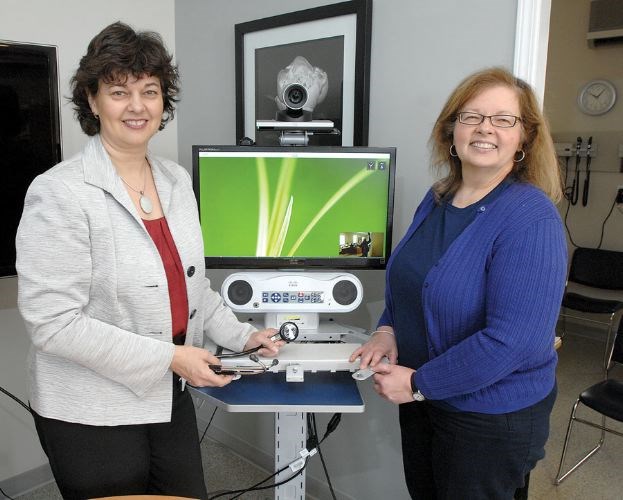The post-heart attack learning curve can be steep, but education and ongoing care programs make the transition easier.
The new Network of Rural to Tertiary Healthcare (NORTH) clinic gives people living with heart failure a dedicated resource centre staffed by nurses specially trained in cardiac rehabilitation and five heart specialists who are able to help patients optimize their medication.
Northern Health's heart function medical lead Dr. Colleen Hennessy said one of the big benefits of NORTH is that staff can dedicate a lot of time to patients to fully explain the dietary, exercise and other life changes which are required to reduce the risk of another heart attack and improve their quality of life.
"It takes a lot of time, it takes a lot of reinforcement," she said. "So in a busy general practitioner's office or the hard-to-get-into specialist's office, the time to spend with the patient is not there."
At NORTH, patients seeking the education component of heart care receive an hour-long introductory visit plus follow-up visits which can focus on different aspects of post-heart attack care. There are also group sessions available either in-person in Prince George or via video-link around the region.
"You're repeating things a lot, because you really want to ingrain it," Dr. Hennessy said.
Between 2009 and 2012 there were 1,600 hospital admissions for heart failure across Northern Health. Even more patients were admitted with another condition and a heart condition was considered a secondary cause. Meanwhile, half a million Canadians live with heart failure issues, with another 50,000 being diagnosed each year.
Since officially opening in February, NORTH clinicians have seen more than 120 patients and that number will grow as more communities in Northern Health sign on. By providing in-depth education and support, NORTH aims to both reduce the number of hospital admissions, which will save the healthcare system money, while at the same time improving the quality of life of patients.
"We know that for these types of conditions, these are not going to be cured," Dr. Hennessy said. "There has to be everyone engaged in the caring of this individual. Not only the person caring for the individual, but their GP, the referring physicians, the attending physicians, everyone has to be in the loop."
As its name suggests, NORTH is a network that connects the specialists based in Prince George with patients around Northern Health. Video conference technology allows patients to access specialist care without leaving their home community and electronic stethoscopes even allow the cardiologists to monitor heart rates remotely.
Nurses are trained in most communities that are part of the network to deliver the educational components face-to-face.
"If there is a nurse in that area that wants to have a clinic, then that nurse gets utilized," Northern Health regional co-ordinator for cardiac and cerebrovascular services Barbara Hennessy said. "If there isn't a nurse [patients] still have an opportunity to get education in their local area because they can do it through video conference."
Prince Rupert, Terrace and Kitimat were the first to connect into the system, with Valemount expected to come online shortly. Vanderhoof is next on the list, with staff training planned for later this summer and four other communities have expressed interest in joining the network.
Dr. Colleen Hennessy hopes many more communities will join the network in the coming months and years, but it's dependent on staff and infrastructure resources available in those locations. She cautioned that growth needs to happen in a manageable way to ensure high-quality care standards are upheld.
"Each one of them requires an individual assessment because it's entirely dependent on what resources they currently have at their site," Dr. Hennessy said.
In addition to providing care to heart attack survivors, the clinic also treats other heart failure conditions, including those caused by viruses or by rhythm problems.
Patients are often referred by their family physicians, who can ask the staff at NORTH to provide a variety of care options, from education to helping patients get on the ideal medication. The length of time someone is assigned to the clinic varies from a few months to much longer, depending on the complexity of the case.
"Adjusting the medications, if the family doctors want us to do it, that's something we can do," Dr. Hennessy said. "If they're comfortable with it, they can carry on with it."



